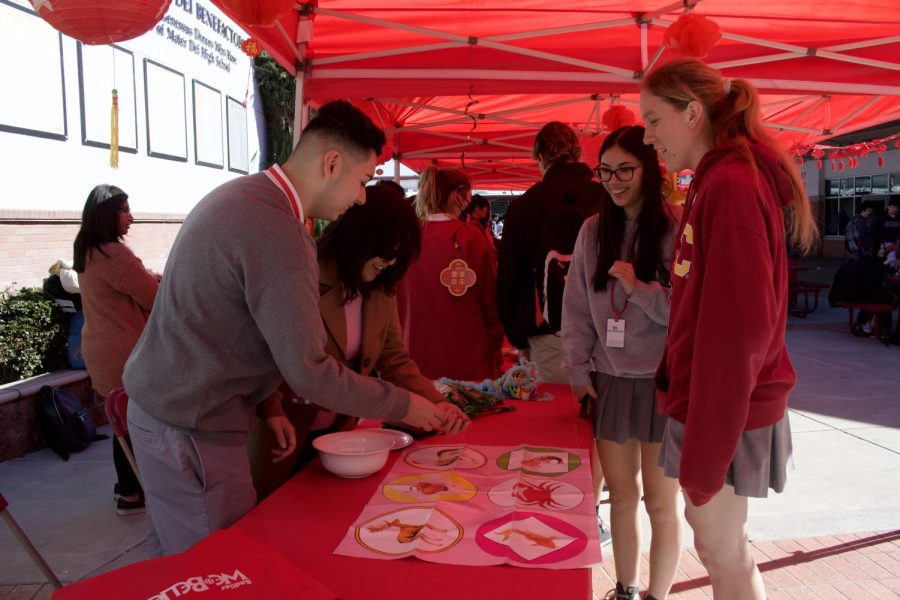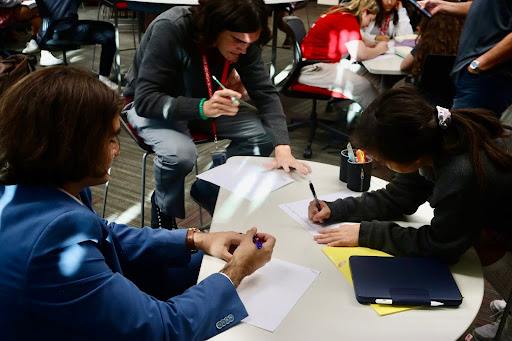Celebrating Lunar New Year at Mater Dei
NEW YEAR FUN Seniors Isabella Faccio and Liv Hertzog play Bầu Cua Tôm Cá, a Vietnamese Lunar New Year game. During lunch in Shamrock Plaza, students from Ms. Marsh’s Chinese classes hosted various activities, such as Chinese calligraphy and Vietnamese card games to celebrate Lunar New Year.
February 7, 2023
Between the myriad of holidays from Christmas to Valentine’s Day, one Asian festival is quickly gaining popularity in the United States and reflecting one of the many diverse cultures of America.
Lunar New Year is a traditional Asian festival that marks the beginning of spring and a new year on the lunar calendar marked by the moon’s monthly cycles. Lunar New Year is an umbrella term for the occasion in which many Asian countries celebrate their new year, the most commonly well-known celebrations being Chinese New Year and Tet, Vietnamese New Year.
In cycles of twelve, different animals correspond to each upcoming year in the moon calendar. This is commonly referred to as the Chinese Zodiac. The Vietnamese Zodiac has a similar cycle which also has twelve different animals. 2023 is the Year of the Rabbit in the Chinese Zodiac and the Year of the Cat in the Vietnamese Zodiac.
Many people in Asian countries celebrate the holiday by going to festivals and parades, honoring ancestors, eating delicious foods, and passing down red envelopes filled with money to younger generations.
Sophomore Jay Qiu’s favorite New Year tradition is receiving the red envelope. While the gift of money is a nice benefit, Qiu also appreciates the good wishes passed down to younger generations.
“[I like] getting the envelope,” Qiu said. “Who doesn’t like free money? But it also sends out a message and blessings from the older people to the young generation.”
While Lunar New Year has always been widely celebrated among Asian countries, its impact on the Western World has only just begun, especially with the greater accessibility to Lunar New Year festivals in the United States. Mater Dei is working to promote a safe and inclusive community for the growing diversity of the student population by encouraging more cultural festivals of importance on school campuses.
“I wish more people could learn about [Lunar New Year] so there’s less of this barrier between the different regions in this world,” Qiu said. “It is very important because that’s how we learn more about each other and thus, we will be more united.”
Qiu is pleased with the acceptance and honor of the Lunar New Year being incorporated into Mater Dei. The Mater Dei administration encouraged students to wear red and yellow, the traditional colors of Chinese New Year, on Wednesday, Jan. 25, to honor this festival. Students in the Chinese classes also hosted Lunar New Year festivities during lunch.
“I think celebrating is important because it represents my cultural identity,” Qiu said. “As an immigrant, I can forget about where I came from. By celebrating this festival, it’s reminding me where I came from.”
Senior Thong Nguyen participated in the Lunar New Year celebration at lunch by playing Vietnamese card games with his friends. The games are his favorite part of celebrating the Lunar New Year, and he loves to share this aspect of the holiday with others.
“Playing card games with my friend is the traditional thing I do with my friends at the festival,” Nguyen said. “It’s like a three card game, where you have to play with four people. [It’s all] based on your luck.”
Like Qiu, Nguyen also commends Mater Dei’s celebration of the Lunar New Year.
“I think Mater Dei is doing a great New Year festival,” Nguyen said. “They have really different cultures from a lot of Asian countries, which is really cool.”
Department Chair of World Languages and Chinese Teacher Zeyda Marsh enjoys watching her students lead and participate in the school’s Lunar New Year festivities.
“I like seeing my students partake in teaching other students how to write calligraphy, how to do paper cuttings, and to do some sampling of good types of eating,” Marsh said.
While residing in Taiwan, Marsh was invited to participate in the extensive Lunar New Year celebrations by her friends. She shares her experiences in this cultural celebration.
“As a student, I was invited to go to my classmates’ homes to celebrate with them,” Marsh said. “I got to visit Middle Taiwan, Taiwan, South Taiwan, and different little cities where my students resided and was invited to partake with them in the nice big food celebrations. [I also got to] watch the dragon dances, the fireworks, wear red and learn about all the taboos and traditions.”
Marsh continues to teach the significance of the Lunar New Year in her Chinese classes, bringing the culture to life by carrying on some traditional festivities.
“We spent a whole day yesterday and today talking about it, especially to the Chinese I students who’ve never taken Chinese; what the celebration means, how it is celebrated, what colors, why red is everywhere—it’s actually to ward off the evil of the monster of the year,” Marsh said. “Even my Chinese IV students who have been with me for four years love and wait for this celebration because they get another new red envelope. I don’t put real money in it but paper money and chocolate coins. They still love having their little envelopes.”
Marsh strongly believes that understanding the Lunar New Year’s cultural practices is crucial to genuinely comprehending Chinese culture. By incorporating Lunar New Year celebrations and knowledge into her Chinese lessons, students become more appreciative of the language.
“It is super important to know about the New Year because it’s the biggest, most important celebration of the Chinese,” Marsh said. “It’s the beginning of a new year and the beginning of spring. And we need to understand what they do, how to celebrate, to actually appreciate the language.”
With Mater Dei’s recognition of the Lunar New Year and encouragement of ways to celebrate it at school, Marsh appreciates the measures Mater Dei has taken to welcome cultural diversity with open arms.
“But what I like the most is how our school, Mater Dei, has embraced the celebrations because we understand how important it is to be culturally aware and to expand our knowledge of this huge celebration not just in China but in almost every Asian country,” Marsh said.






![SING THE NIGHT AWAY Members of Mater Dei’s a cappella ensemble Vocal FX soulfully perform their song Dancing On My Own at MD Unplugged. Vocal FX primarily sings pop songs using unique vocal arrangements that showcase a beautiful blend of voices. Not only do they create wonderful music, but they also foster a sense of community. Sophomore Sydnie Hansen appreciates the bonding between members of Vocal FX as they sing. “I love each person in Vocal FX—they are kind, funny, and so incredibly talented,” Hansen said. “It is always so fun to sing such awesome [songs] together!”](https://thescarletscroll.com/wp-content/uploads/2024/10/IMG_0865.jpeg)



![SERVING UP SMILES Embracing her role as a Sodexo volunteer, freshman Athena Beneck prepares her register for the long line of students during lower lunch. As a student lunch worker for only two months now, Beneck has appreciated the connections she has made while interacting with other students and believes being a lunch volunteer is not only fun but rewarding. “I really enjoy that I get to serve those around me,” Beneck said. “[I] meet new people when I take their orders and receive free lunch.”](https://thescarletscroll.com/wp-content/uploads/2024/10/IMG_0861.jpeg)